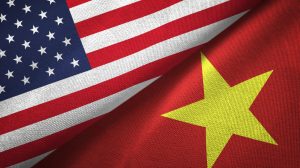On Monday, Reuters reported that two Vietnamese political activists are relocating to the United States, under a private agreement between Hanoi and Washington that preceded the two governments’ agreement to upgrade their bilateral relationship last week.
The report, which cited U.S. officials familiar with the matter, stated that “a human rights lawyer who campaigned for accountability for police abuses” and “a Catholic parishioner evicted from his home” would be relocated to the U.S. with their families.
There the families are expected to seek resettlement under the country’s “Priority 1” refugee program. While the activists were not currently in custody, they had been barred from leaving Vietnam, Reuters reported. The U.S. officials did not name the individuals for security reasons.
According to the report, the expatriations were negotiated as part of a private agreement negotiated ahead of President Joe Biden’s recent visit to Hanoi on September 10. The state visit saw Hanoi and Washington announce the establishment of a Comprehensive Strategic Partnership, placing the U.S. alongside China and Russia at the top of the nation’s diplomatic hierarchy.
A U.S. official told the news agency that prior to the U.S. president’s visit, the two nations had signed a private agreement under which Vietnam had pledged to respect religious freedom, improve prison conditions and labor rights, and allow greater freedoms for independent civil society groups. As part of this agreement, which Reuters emphasizes that it was not able independently to review, Vietnam’s government also agreed to release two imprisoned activists: a “legal scholar focused on religion” who was allowed to fly to Germany, and “another individual sentenced for tax evasion related to his NGO.”
While these were also unnamed by the officials, they seem to correlate with two dissidents who were released from prison in the weeks leading up to Biden’s visit.
The first was the legal expert Nguyen Bac Truyen, who reportedly arrived in Berlin on September 8. Truyen was targeted for his religious freedom advocacy, particularly on behalf of members of the besieged Hoa Hao Buddhist sect, but was also involved with the Catholic Redemptorist Church, which, according to the U.S. Commission on International Religious Freedom, “provides legal assistance to victims of land expropriation and health services to more than 5,000 veterans of the former Republic of Vietnam.”
For his efforts, Truyen was imprisoned from 2006 to 2010 on charges of “conducting propaganda” against the state. He was again arrested in 2017 and later sentenced to 11 years in prison for “carrying out activities aimed at overthrowing the people’s administration.”
The second political prisoner is seemingly the journalist Mai Phan Loi, who was released from prison on September 10, 18 months before the end of his sentence for alleged tax fraud. Loi, a well-known political commentator and press freedom defender, is one of a number of activists who have been arrested over the past two years on transparently political tax charges.
The Reuters report shed some light on the compromises that preceded the landmark upgrade in the diplomatic partnership between the U.S. and Vietnam. In particular, it demonstrates the U.S. desire to preserve some minimal degree of human rights accountability into its new-look relationship with Vietnam.
Over the past decade, as relations between the U.S. and Vietnam have grown closer, Washington has attracted strong criticism for downgrading the importance of human rights issues in its dealings with the one-party state. Despite claiming to be assembling a league of “like-minded” democracies with which to confront a new authoritarian Beijing-Moscow axis, it has chosen to upgrade ties with Vietnam at a time that, as Human Rights Watch pointed out earlier this month, it continues to hold at least 159 political prisoners in custody.
As Carolyn Nash of Amnesty International USA wrote in these pages prior to Biden’s visit to Vietnam, Hanoi’s “criminalization of free expression is antithetical both to the purported values of the Biden administration and to supporting climate activism and labor organizing.”
The U.S. should be applauded for managing to free four individuals and their families from their unjust persecution at the hands of the Vietnamese party-state. At the same time, as Vietnam has become a more important factor in Washington’s China-centered Asia policy, there are now strict limits to how much it can now demand of the Communist Party of Vietnam (CPV) on the human rights front, without activating Hanoi’s reflexive fear that the U.S. is seeking to foment a “peaceful evolution” away from communist rule.
Whatever the CPV government has agreed to the Biden administration in terms of labor organizing, civil society, and religious freedom, it has no intention of giving up its monopoly on political power. Indeed, Vietnamese state media described the Biden visit and the resulting diplomatic upgrade as definitive proof that the U.S. now respects the nature of Vietnam’s political system – and by implication, will cease any attempts to change or overturn it.
In the circumstances, allowing a small number of dissidents to go into exile abroad is about the best that the U.S. could hope for. For its own part, Hanoi likely viewed it as a relatively cheap price to pay for to strengthen an important relationship – and to sustain the notion that human rights plays anything more than a vestigial role in the U.S.-Vietnam relationship.

































